- Home
- Victor Gischler
No Good Deed Page 2
No Good Deed Read online
Page 2
“A note?”
“It seemed simpler.”
“When are you coming back?”
“Yeah, about that.” Enid zipped the suitcase shut. “I’m not. It’s a tour company, starting in Chicago and then going to the West Coast. This is big for me.”
“What? You were just going to leave without saying … anything?”
“See? You’re upset.”
“I’m … but … well, what the hell? How did you think I would react?”
“Thus, the note.” Enid’s face softened, and she put her hand gently against Francis’s cheek. “Look, it was good for a while. But my career is dead here, and I’m not doing any more crappy waitress shifts in that crappy diner. I smell like grease all the time, and since I’ve gone vegan, the smell of bacon makes me ill. You’re nice, Francis, but you’re not give-up-my-career nice. Take care.”
She turned, dragging the suitcase toward the door on its little wheels.
“Wait!”
She opened the door, went out without looking back.
“Enid!”
Francis started after her, realized he was in his underwear, ran back to the bedroom, grabbed a pair of sweatpants off the floor. He danced back down the hall, trying to get his legs into the sweats. He caught his toe in the fabric and went down, smacking his head hard against the open door.
“Fuck!”
He blinked the stars out of his eyes, stood, pulled the sweats on carefully, then dashed down three flights and out the front door of his building.
Just in time to watch Enid’s taxi pull away.
“Damn it.”
Francis trudged back upstairs, caught sight of the clock.
“Damn it!”
He was definitely going to be late, but there was still a chance he could slip into the office without Resnick noticing. There was usually a ten- or fifteen-minute grace period, people hanging up jackets, pouring cups of coffee, clicking on computers, and checking voice mail. If he hurried, Francis could make it.
He peeled off the sweats, put on charcoal-gray slacks, black socks, wing tips. He grabbed two shirts off the floor. He smelled the white one. Ugh. He tossed it aside and put on the blue one. He grabbed a mustard-yellow tie. Tied it. The skinny part was longer than the wide part. Oh, come on. He tied it again. The skinny part was still too long. Screw it. He tucked the skinny part inside his shirt.
Coffee. Francis still needed caffeine. He threw open the kitchen cabinet with the to-go cups. There were at least a dozen. Not a single cup matched a lid. How was that possible? He grabbed the biggest, filled it, and headed for the door.
Francis hit the street ten seconds later, fast-walking toward his subway station, hot coffee spilling over his fingers.
“Ouch. Shit.”
In the back of his mind, he was still thinking about his tie. Francis wondered if he were OCD. Not for the first time. He didn’t actually know the clinical definition of OCD. He just knew he hated loose ends, small tasks inappropriately or halfway done.
Fussy, Enid had said. She’d had a way of boiling things down. Not that he was fussy about everything. He had no problem leaving dirty clothes on the floor or dishes in the sink. She’d yelled at him about that too.
There’s no pleasing her. Probably better off she’s gone.
But Francis didn’t feel it in his gut.
He glanced down at his wristwatch. Yeah, he was going to be late. And he was dangerously close to crossing from buffer-zone late to noticeably late. He walked faster.
The putrid smell hit him like a fist. Francis walked past the mouth of an alley with an enormous pile of garbage. Why did they let it pile up like that? Maybe there was another strike. He took a deep breath and kept walking.
Then stopped.
He didn’t have time for this, but he couldn’t help it. He had to go back and see if he’d seen what he saw.
Francis went back and looked. It was a suitcase, perched atop one of the trash piles.
And it was open.
He stood there looking at it and realized what had caught his attention. A few things, actually. First, it was clean. Not just the suitcase, but the contents too. Women’s clothes—silk blouses, fashionable skirts, and lots of underwear. He reached in tentatively and plucked out a pair of panties—lace, a soft pink. The tag still dangled from them and read THE SMART SHOPPE. The suitcase was full of panties, never worn, perfectly folded, tags still on.
An old man walked by, giving him the stink eye from under a porkpie hat. Francis tossed the panties back into the suitcase like he’d been burned.
In addition to the suitcase’s contents, Francis noticed something else. It wasn’t like a normal suitcase, not like Enid’s black one with the zippers and wheels. Francis always wondered about such cookie-cutter suitcases. All black, all the same size to fit into airline overhead bins, all looking exactly the same, so people put stickers or string on them so they could find them on the baggage carousels.
The suitcase atop the garbage pile didn’t look like Enid’s at all. Not black. No little wheels. It looked like something from a 1940s movie, big and square, some kind of alligator skin or probably fake. Brass clasps. Except it couldn’t be from the 1940s because, like its contents, it was obviously brand-new.
There was something else inside besides clothes. A small, soft leather case. He took it and flipped it open. It was a case for business cards and held about twenty of them, white with a simple typeface:
[email protected]
He took one of the cards and put it in his shirt pocket, tossed the rest back into the suitcase.
Just leave it. Resnick is going to have your ass on a plate.
Francis moved quickly before he could change his mind, slamming the suitcase closed and clicking the brass latches into place. He double-timed it down the sidewalk, coffee still sloshing. The suitcase was built solidly, and he listed to one side with the weight of it. This wasn’t going to work, not on a crowded subway and not when he was trying to move fast.
He schlepped it another half block and turned into the Patty Melt.
Just as he’d hoped, Francis knew the woman behind the counter, a fifty-something world-weary veteran of New York greasy spoons, named Amanda. Sharp tongue, heart of gold, sore feet.
“Enid don’t work today, Francis,” Amanda told him. The way she said it made it clear Amanda didn’t know Enid had weighed anchor for good.
Francis thought it an inopportune time to set the record straight and asked, “I hate to ask, Amanda, but is there a place I can stash this? I’m already late.”
Amanda frowned but said, “In the cooler, I guess. But you need to get it after work. I can’t leave it overnight.”
“You’re the best.”
Amanda took the suitcase, and Francis was already out the door, hoofing it hard down the sidewalk.
* * *
“Can I see you in my office, Mr. Berringer?”
Francis had almost made it to his desk, thought he would actually slip by unseen, and then Resnick leaned out of his office door and called him in. A sigh leaked out of Francis, and he headed for Resnick’s door, shoulders drooping.
Resnick’s secretary, Naomi, sat at her desk outside of Resnick’s door, some kind of Mad Men throwback with too much makeup and hair piled on top of her head. She held a coffee mug that said WORLD’S GREATEST AUNT. She mouthed sorry at Francis as he passed.
Francis shrugged.
Inside, Resnick told him to shut the door.
Francis shut it.
Bart Resnick was Francis’s section manager. He sported a Johnny Unitas buzz cut, pink clean-shaven cheeks, a striped tie with a short-sleeved shirt. You could slice salami with the crease down his pants. He was always squinting, like he was trying to see something in you he could exploit. He looked at Francis that way now, fidgeting with a rubber band on his desk, seeing how far it would stretch without breaking. A USMC coffee cup on his desk filled with pens and pencils.
Francis was pretty sure a ca
sual study of everyone’s coffee mug in the office would tell him all he needed to know about these people.
“How long have you been a purchasing agent here at McGyver & Roth, Mr. Berringer?” Resnick asked.
“About a year?”
“Fourteen months.”
Yeah. That’s about a year. Dick.
“And,” Resnick pressed, “how many times in that span have you been late for work?”
“I guess at least three or four times.”
“Eleven times.”
Shit.
“That’s not going to work, Mr. Berringer,” Resnick said. “It’s not shipshape.”
“No, sir.”
Shipshape was new. Resnick usually favored other expressions. He was insistent that everyone on his floor have their ducks in a row and that all his people should do everything according to Hoyle.
“You’re on McGyver & Roth time. When you come in late and take a paycheck, you’re stealing from McGyver & Roth.”
“I understand.”
“I don’t think you do,” Resnick said. “Are there mitigating circumstances that might explain today’s tardiness, Mr. Berringer?”
I set the alarm wrong, and my girlfriend left me, and I found a suitcase full of panties. “No, sir.”
Resnick held up a single finger. “One more chance, Berringer. After that, I have to refer you to HR.” He shrugged, tried to look sympathetic, but it came off as gassy. “After that, it’s out of my hands.”
“I understand, Mr. Resnick.”
Resnick rose, came around to Francis’s side of the desk. “I’m glad you do.” With one hand, Resnick opened his office door. With the other, he gave Francis’s shoulder a fatherly squeeze. “You know I don’t want to be the bad guy here. I’m your pal.”
Francis felt his face go hot.
“Just straighten up and fly right, and we won’t have any problems.”
Straighten up and fly right was back in the rotation. Great.
“Yes, sir. Thank you.”
And a second later, Francis was standing next to Naomi’s desk with a sick feeling in his gut. He glanced over at her, hoping for a sympathetic look. That was her specialty, a sympathetic look or a squeeze on the arm. Never mind Mr. Resnick. You know how he can be. It’s nothing personal.
But she hadn’t noticed Francis. She frantically shuffled through the papers on her desk.
“Oh, shit.” Her voice a hoarse whisper. “Shit, shit, shit.”
2
“You okay?” Francis asked.
Naomi’s face was bleak with stress. “I’ve lost the damn zip codes for this week’s direct mailing.” She opened every drawer in her desk, slammed them closed again, shuffled through the same pile of papers she’d just shuffled a moment earlier. “They were on a yellow Post-it on top of all the paperwork that went down to marketing. It’ll take me an hour to look them up again, and they want them now before the deadline.”
“The Post-it note on the papers I took to the copy room yesterday?” Francis asked. “Five zip codes?”
“Yes!” Naomi looked at him hopefully. “Have you seen it?”
“Get a pencil.”
“What?”
“Get a pencil and write this down,” Francis told her.
She eyed him with curiosity but grabbed a pencil and a pad.
He said, “70806, 70808, 70812, 70815, 70836.”
She scribbled them down, her eyes coming back up to pin Francis. “These have to be right or I’m screwed.”
“Francis doing his trick again?”
Naomi and Francis both turned to look at the lanky guy talking to them across the top of his cubicle divider. Marty Clarke had been at the company about as long as Francis, good-natured and nerdy, Clark Kent glasses and a nose like a beak, thinning black hair.
“It’s not a big deal, Marty,” Francis said.
Another head popped up from the next cubicle over from Marty’s, freckles and red hair and bright green eyes. He couldn’t see it from where he was standing, but Francis could picture her Hello Kitty coffee mug. Becky had been hired only six weeks ago and was still learning the ways of the office.
“Francis does a trick?” she asked.
Francis frowned at Marty. “It’s not really a trick.”
“He can remember numbers perfectly,” Marty said.
Becky’s eyes widened with interest. “Oh, like a photographic memory?”
“Not really,” Francis said.
“Francis, are you sure these numbers are right?” Naomi was urgent about it. “I have to take these down right now.”
“Can you read a book and then, like a year later, recite it back?” Becky asked.
Francis shook his head. “It’s not like—”
“Not photographic memory,” Marty said. “More like the genius on that nerd show. Eidetic memory.”
Naomi grabbed Francis’s arm, insistent. “Francis!”
“The numbers are right, Naomi,” Francis said. “I promise. I’m never wrong about—”
Naomi was already fast-walking toward the elevator.
“Can you count cards?” Becky asked.
“I bet he could totally take down a casino,” Marty said. “We should pool our money this weekend and hit Atlantic City.”
“Guys, no, really,” Francis said. “It’s not like any of that. I just remember numbers. If they’re in a row or a column. I remember the order. It’s nothing more than that.”
“Can you add up all the numbers in your head like a human calculator?” Becky asked.
“No.”
“Oh.” Becky looked vaguely disappointed before sinking back down into her cubicle.
“Well, I think it’s cool,” Marty said. “You could probably cobble together some kind of vaudeville act. The Numerical Memory Man!”
Marty’s raw enthusiasm drew a weak smile out of Francis. “Maybe. Right now, I’d better get back to my desk.”
Francis wandered into the cubicle maze, zigzagging toward his desk at the core of the humbling gray malaise. His desk was a small, tiny rectangle of metal with two drawers and a five-year-old desktop computer. He turned the computer on. It hummed a dirge, booting up. The morning email included the usual repetitive corporate directives. There was also something from Naomi about leaving food in the break room fridge over the weekend.
He scanned his in-box, hoping to see some final word from Enid, maybe a change of heart and a promise to come home soon. There was no such email. Francis pushed back in his chair, sighed.
He remembered the business card in his shirt pocket, took it out, and squinted at it.
He clicked Compose, entered the email address, and wrote Suitcase in the subject line.
Dear Ghost Girl,
Yeah, he felt dumb typing that.
I found your suitcase on a pile of trash. Must be a mistake since everything inside is brand new. Would be happy to arrange a good time and place to return it to you.
Francis Berringer
Francis read over the message. Wow, was he really that boring? But what else was there to say? He could arrange to leave the suitcase with the reception desk in the lobby downstairs, and Ghost Girl could pick it up in the morning. If she even replied at all.
He glanced at the two photos taped to the bottom of his computer monitor.
The first was from a back issue of Adventure Travel. It was a picture of some people in a big inflatable raft going down some river rapids. There was an article about a place in Colorado on the other side. It had been the only adventure vacation in which Enid had ever shown any interest. Francis remembered being surprised, because she hated getting her hair wet. He’d been setting a bit aside from each paycheck for the trip.
Francis pulled the magazine page down, folded it, and stashed it in his shirt pocket. Maybe he’d still take the trip on his own next summer. He tried to picture himself setting out alone on an adventure vacation but couldn’t.
The other photo showed Francis and Enid in Central Park. It had bee
n a bright, spring day, and they’d stopped a woman walking her dog to ask if she’d take the picture. They both looked so ridiculously happy, Francis hugging Enid from behind, her twisting to kiss the point of Francis’s chin, but her eyes coming back to the camera. They’d had hot dogs and then caught a bargain matinee of Mamma Mia!, which Francis had liked and which Enid had thought cute that Francis had liked it.
It had been a good day.
Abruptly, Francis snatched the photo off the monitor and made to rip it in half. He stopped himself. There was no point to such a dramatic gesture. Who would see or care? He tossed it into the top drawer of his desk with the paper clips and Post-it notes. A quick glance around his cubicle depressed him suddenly. With the photo of Enid in his desk drawer, there was not a single thing to identify the tiny space as his. He’d refused to invest in a self-identifying coffee mug on the grounds that he would not be in this place the rest of his life. It could have been the cheerless cubicle of any other cog in the corporate machine.
Francis sighed long and loudly and ran his fingers through his hair. He pushed away from his desk and stood.
He walked four cubicles down, took a deep breath, and leaned against the flimsy cubicle wall, attempting nonchalance, crossing his arms, trying to look cool or casual or something, knew instinctively it wasn’t working but couldn’t quite stop himself.
“So, hey, Rhonda.” Say something smooth. “Whassup?”
Idiot.
Rhonda didn’t look up at him. Her gaze was fixed on the compact mirror in her hand. She traced a line around the edge of her lips with a makeup pencil. Rhonda was one of those women put together so perfectly that Francis found himself a little short of breath around her. A designer skirt cut just above the knees, stockings hugging perfect legs and stiletto heels. A sheer cream blouse. Pearls. Blond hair like she’d just stepped out of the salon. Her perfume made Francis a little dizzy.
Almost everyone agreed there was something about Rhonda that didn’t quite fit in with their little cubicle community, like she was just biding her time until a rich-enough guy came along to marry her away from this place. In a city of doctors and lawyers and stockbrokers, it was only a matter of time.
She switched to eyeliner, still watching herself closely in the little mirror. “Hello, Francis.”

 The Shadow Sorceress
The Shadow Sorceress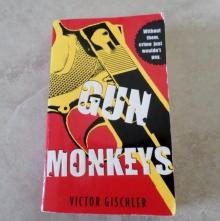 Gun Monkeys
Gun Monkeys Go-Go Girls of the Apocalypse
Go-Go Girls of the Apocalypse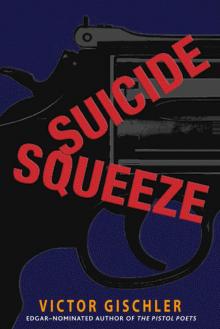 Suicide Squeeze
Suicide Squeeze The Pistol Poets
The Pistol Poets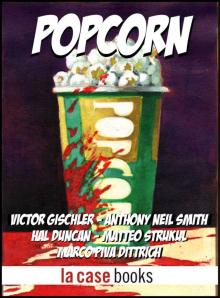 POPCORN
POPCORN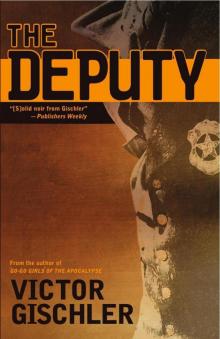 The Deputy
The Deputy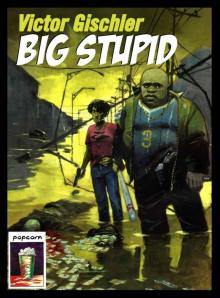 Big Stupid (POPCORN)
Big Stupid (POPCORN) Pistol Poets
Pistol Poets Shotgun Opera
Shotgun Opera The Tattooed Duchess (A Fire Beneath the Skin Book 2)
The Tattooed Duchess (A Fire Beneath the Skin Book 2) Ink Mage
Ink Mage Go-Go Girls of the Apocalypse: A Novel
Go-Go Girls of the Apocalypse: A Novel Stay
Stay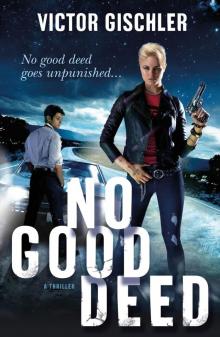 No Good Deed
No Good Deed Gestapo Mars
Gestapo Mars A Painted Goddess
A Painted Goddess